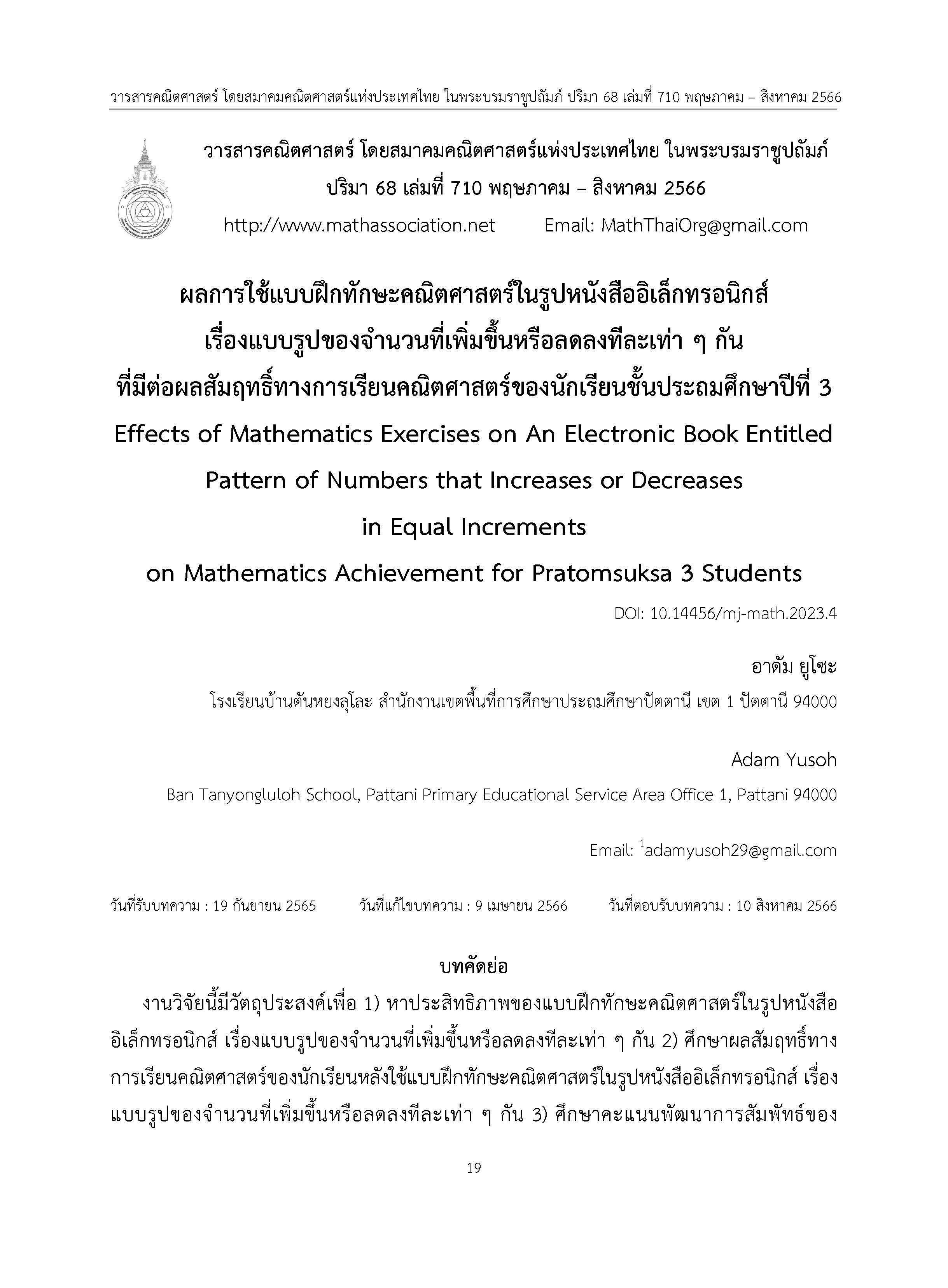Effects of Mathematics Exercises on An Electronic Book Entitled Pattern of Numbers that Increases or Decreases in Equal Increments on Mathematics Achievement for Pratomsuksa 3 Students
Main Article Content
Abstract
The purposes of this research were : 1) to study the efficiency of the mathematics exercises on an electronics book entitled pattern of numbers that increases or decreases in equal increments Pratomsuksa 3 students; 2) to study mathematics achievement after learning through mathematics exercises on an electronics book entitled pattern of numbers that increases or decreases in equal increments; 3) study relative gain score of student’ learning achievement, and 4) to explore the students' satisfaction towards learning the mathematics exercises on an electronics book entitled pattern of numbers that increases or decreases in equal increments. The samples were 23 Pratomsuksa 3/1 students studying in the 1st semester of the academic year 2022 at Ban Tanyongluloh School. Cluster purposive sampling was used. The instruments used in this study were: 1) 10 sets of the mathematics exercises, 2) 3 learning activity lesson plans, 3) 4–choice achievement test comprising 10 items and 4) a questionnaire on students' satisfaction. The statistics used for analyzing the collected data were percentage, mean, standard deviation and t–test for dependent sample. The results of the research were shown as follows: 1) The mathematics exercises on an electronics book entitled pattern of numbers that increases or decreases in equal increments had an efficiency of 88.96/86.52 2) The students learned through the mathematics exercises on an electronics book after learning had higher achievement than before learning. 3) 13 students, or 56.82% of all student, had a relative gain score in higher level and 4) The satisfaction of the students towards the mathematics exercises on an electronics book entitled pattern of numbers that increases or decreases in equal increments as a whole was at the highest level.
Article Details
References
กิดานัน มลิทอง. (2548). เทคโนโลยีการศึกษาและนวัตกรรม. กรุงเทพฯ: อรุณการพิมพ์.
Malitong, K. (2005). Innovation and technology Education. Bangkok: Arun Printery.
จิตราภา กาวิชัย และอภิชา แดงจำรูญ. (2564). การพัฒนาหนังสืออิเล็กทรอนิกส์ เรื่อง เศษส่วน เพื่อพัฒนาผลสัมฤทธิ์ทางการเรียนวิชาคณิตศาสตร์ สำหรับนักเรียนชั้นประถมศึกษาปีที่ 5 โรงเรียนคลองหนองใหญ่ (ทองคำ ปานขำอนุสรณ์). วารสารนวัตกรรมการศึกษาและการวิจัย, 5 (2), น. 238 – 251.
Gavichai, J. and Dangchamroon, A. (2021). The Development Electronic Books in Fraction to Enhance Mathematics Achievement for Prathom Suksa 5th Students at Klongnongyai School (Thongkam Parnkham-anusorn). Journal of Educational Innovation and Reserach, 5 (2), p. 238 – 251
จันทร์เพ็ญ พวงสมบัติ สมทรง สุวพานิช และ นิคม ชมภูหลง. (2555). ผลการจัดกิจกรรมการเรียนรู้คณิตศาสตร์โดยใช้ปัญหาเป็นฐานเรื่องสมการเชิงเสน้ตัวแปรเดียว ชั้นมัธยมศึกษาปีที่ 1. วารสารมหาวิทยาลัยราชภัฏมหาสารคาม, 6 (1), น. 73 – 80.
Phuansombat, C., Suvaphanit, S. and Chomphoolonge, N. (2012). Results of Problem-based Mathematical Learning Activities on Solving Linear Equations for Grade 7th Students. Rajabhat Maha Sarakham University Journal, 6 (1), p. 73 – 80.
ชูศรี วงศ์รัตนะ. (2553). เทคนิคการใช้สถิติเพื่อการวิจัย (พิมพ์ครั้งที่ 12). นนทบุรี: ไทเนรมิตกิจ อินเตอร์โปรแกรสซิฟ.
Wongrattana, C. (2010). Techniques for UsingStatistics for Research (12th ed.). Nonthaburi: Taineramitkij Inter Progressive.
บุญชม ศรีสะอาด. (2553). การวิจัยสำหรับครู (พิมพ์ครั้งที่ 3). กรุงเทพฯ: สุวีรียาสาส์น.
Srisa-ard, B. (2010). Basic Research (3th ed.). Bangkok: Suweeriyasan.
พจนา ชำนาญกุล และชัยวัฒน์ วารี. (2559). การพัฒนาหนังสืออิเล็กทรอนิกส์วิชาคณิตศาสตร์สำหรับนักเรียนชั้นประถมศึกษาปีที่ 2. วารสารนวัตกรรมและการจัดการ มหาวิทยาลัยราชภัฏสวนสุนันทา, 1 (1), น. 39 – 45.
Chamanankul, P. and Waree, C. (2016). The Development of Electronic Books for Mathematics for Grades 2 Students. Journal of Innovation and Management : Suan Sunandha Rajabhat University, 1 (1), p. 39 – 45.
พรรณทิพย์ ผลเกิด. (2557). การพัฒนาหนังสืออิเล็กทรอนิกส์ วิชาคณิตศาสตร์ เรื่องเศษส่วนและทศนิยม สำหรับนักเรียนระดับชั้นชั้นมัธยมศึกษาปีที่ 1. (วิทยานิพนธ์ครุศาสตร์อุตสาหกรรมมหาบัณฑิต, สถาบันเทคโนโลยีพระจอมเกล้าเจ้าคุณทหารลาดกระบัง).
Phonkerd, P. (2014). The Development of An Electronic Book on Mathematics Subject in Fractions And Decimal for Mathayomsuksa 1 Students. (Master’s Thesis, King Mongkut’s Institute of Technology Ladkrabang).
พิสุทธา อารีราษฎร์. (2548). การพัฒนารูปแบบกระบวนการเรียนรู้ โดยอาศัยคอมพิวเตอร์. (วิทยานิพนธ์ครุศาสตร์อุตสาหกรรมมหาบัณฑิต, สถาบันเทคโนโลยีพระจอมเกล้าพระนครเหนือ)
Areerard, P. (2005). A Development of Model for Processing the Learning Reform Using Computer Technology. (Master’s Thesis, King Mongkut’s Institute of Technology North Bangkok).
รัชนิดา พจนนุสนธิ์. (2553). การพัฒนาหนังสืออิเล็กทรอนิกส์ เรื่องการบวกที่มีผลลัพธ์และตัวตั้งไม่เกิน 100 กลุ่มสาระการเรียนรู้คณิตศาสตร์ ชั้นประถมศึกษาปีที่ 2. (วิทยานิพนธ์ครุศาสตร์มหาบัณฑิต, มหาวิทยาลัยราชภัฏมหาสารคาม).
Pojjananuson, R. (2010). Developing The Electronic Book Entitled “Addition with The Results and Summand Does Not Exceed 100” in The Mathematics Learning Strand for Pratom Suksa 2. (Master’s Thesis, Rajabhat Mahasarakham University).
อาฟีฟี ลาเต๊ะ. (2565). การวิจัยในชั้นเรียน (พิมพ์ครั้งที่ 2). กรุงเทพฯ: ไอ. เจ. สยาม จำกัด.
Lateh, A. (2022). Classroom Action Research (2th ed.). Bangkok: I. J. Siam.
สุมาลี มีสกุล. (2563). ผลของการใช้ชุดการสอนที่ใช้การจัดการเรียนรู้แบบค้นพบร่วมกับเทคนิคการหาคำตอบของโจทย์ปัญหาแบบ RIDD ที่มีต่อผลสัมฤทธิ์ทางการเรียนวิชาคณิตศาสตร์เสริม 6 ของนักเรียนชั้นมัธยมศึกษาปีที่ 6 โรงเรียนวิเศษไชยชาญ “ตันติวิทยาภูมิ” จังหวัดอ่างทอง. วารสารศิลปากรศึกษาศาสตร์วิจัย, 12 (2), น. 257 – 271.
Meesakul, S. (2020). The Result of Using The Supplementary Mathematics Instruction Packages by Discovery Learning and RIDD Problem Solving Technique on Learning Achievement of Mathayomsuksa VI Students at Wisedchaichan “Tantiwittayapoom” School in Angthong Province. Silpakorn Education Research Journal, 12 (2), p. 257– 271.
กระทรวงศึกษาธิการ. (2551). หลักสูตรแกนกลางการศึกษาขั้นพื้นฐาน พุทธศักราช 2551. กรุงเทพมหานคร: โรงพิมพ์ชุมนุมสหกรณ์การเกษตรแห่งประพเทศไทย จำกัด.
Ministry of Education. (2008). Basic Education Core Corriculum B.E. 2551 (A.D. 2008). Bangkok: The Agricultural Cooperative Federation of Thailand Limited.
Fraenkel, J. R. and Wallen, N. E. (2006). How to Design and Evaluate Research in Education (6th ed.). New York: McGraw-Hill.


